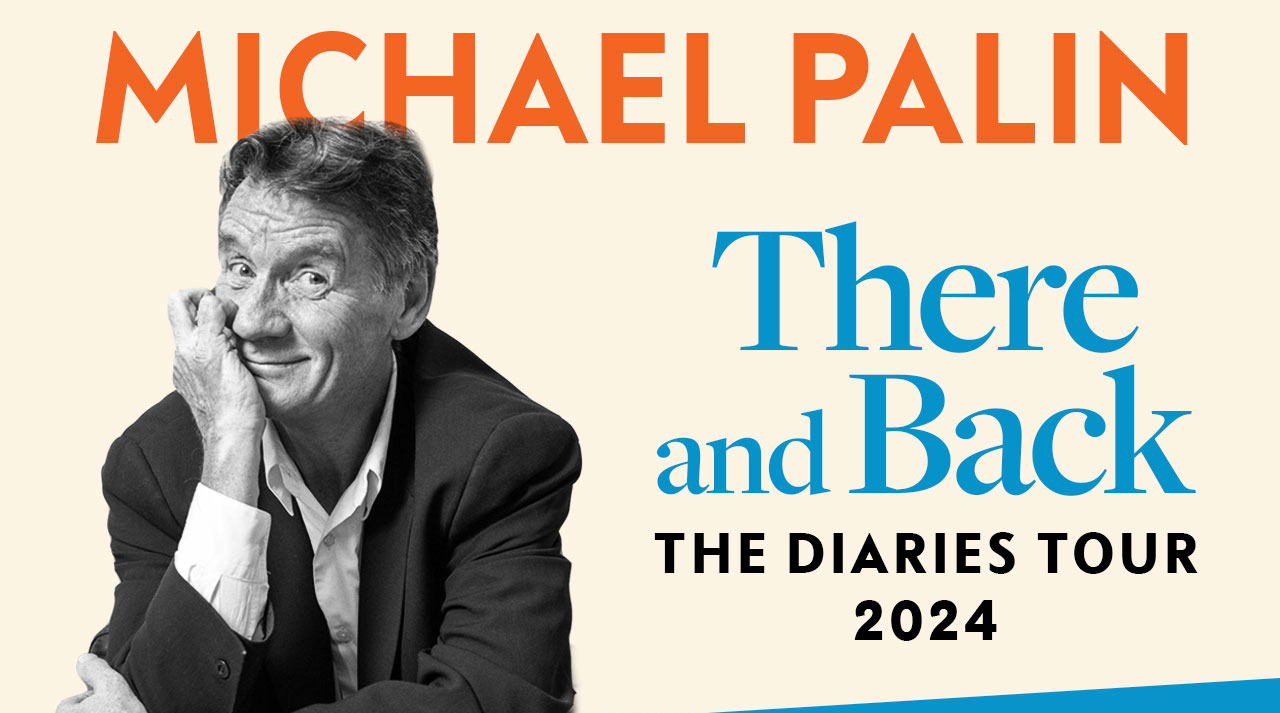Genial, funny, and historic memories from the best-loved Python

Michael Palin | Winding Wheel Theatre, Chesterfield | 13th October 2024
There and Back: Diaries 1999-2009 (Weidenfield & Nicolson, 2024): £30
In 1988 I turned two years old, and Michael Palin travelled around the world in 80 days. I first watched the series several years later with my parents, aged seven or eight, when it was repeated on BBC1. A strange mixture of ad-libbed comedy, travel adventure, and memoir. The presenter was a kind, funny man with a gentle voice. He seemed old to me then. He was 45.
The day after each episode of Monty Python was broadcast my mum and her friends recreated the sketches in the playground. She is now some years retired. I too absorbed Monty Python until it became part of my very being. He’s not dead, he’s just resting. We are the Knights who say ‘ni’. But when Palin set off around the world, he was leaving Monty Python behind and beginning again. Michael Palin not as a Python but as… well, what? A man seemingly ageless, with a warmth and humour that draws people to him, whether he is in a BBC studio, on a dhow from Dubai to Mumbai, or onstage in a theatre in Chesterfield. And yet he is not ageless. He is 81.
The queue outside the theatre is peppered with grey hair and gilets. Many people here seem to have age-related mobility problems. My partner and I are way short of the average age, which is not to make any great claims for my own youthfulness. Palin is here to read from his new book, There and Back, the fourth-published volume of the diaries he’s been keeping since 1969. This latest volume spans the years 1999-2009.
In case it isn’t clear already, I love Michael Palin. Him and his work unlock something mystifyingly nostalgic and sentimental inside me. I feel in some way that what he has done, I have also done – or that he has done it for me as well as for himself. Sitting waiting for him to appear I imagine that I might be overcome, perhaps cry happy tears. But when – after a sort of ‘greatest hits’ video compilation of his sketches and programmes – he strides out onto the stage, waves, and starts talking, I just clap and smile and listen. Part of his appeal is the sense of familiarity he engenders. It’s as if he’s always been here, and always will be.
Palin reads passages from the book and intersperses them with related video clips which he activates himself using a hand-held remote control. The setup feels, not intimate exactly, but personable and natural. Unsurprisingly he is at his ease onstage, and where the occasion arises shows a wonderfully deft impressionist’s ability. A quote from the short (and hilariously savage) biography John Cleese wrote for him during the publicity for Life of Brian (1979) is delivered with Cleese’s rising, incensed haughtiness. Shortly afterwards Palin reads a letter from George Harrison in the latter’s nasal tones.
The anecdotes are both typical and touching: getting a debilitating bout of food poisoning in the Sahara because he was too polite to refuse an obviously suspect meal; hearing the news of the 9/11 attacks over breakfast on a shimmering, peaceful morning in Agadez, Niger. His politics comes through gently but firmly. The understanding that most of the locals around him that morning in Agadez lacked the educational and political privilege even to know what was happening in New York; a considered, even-handed condemnation of the wars in Afghanistan and Iraq that took place in the years that followed.
In short, he talks and acts like you hope he would. And this is perhaps not by accident. Palin relays advice he was given by Alan Bennett while deciding whether or not publishing his diaries was a good idea. ‘Be the version of you that people want you to be,’ Bennett told him. ‘Bad luck,’ Palin says to the Chesterfield crowd, ‘you got the boring version.’ The warm laughter of the audience shows that, whatever version of the ‘real’ Palin we’ve been getting, it’s anything but boring.
Naturally, signs of age are upon him. He stands before us lean and vigorous, but bending forwards just a little as if whipped by a wind. He is silver and lined, and when he speaks his voice comes to you loosened by the slackening of facial muscles. He has defined and demarcated my life to such a degree that I was often not even aware of it. I know I am not alone in this. Palin’s writing and television work has traced endings and beginnings across this century and the last. As he leaves the stage in Chesterfield, many people in the crowd begin rising in ovation, some in defiance of age and mobility problems. He seems half-embarrassed. Perhaps he doesn’t – and can’t – know that they want to thank him for giving shape to their lives. Even if such a shape can only ever be temporary.
Reviewed by Joseph Hunter
